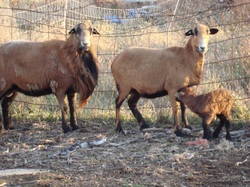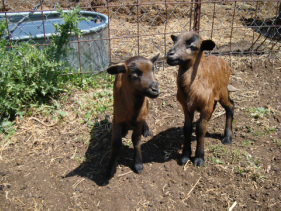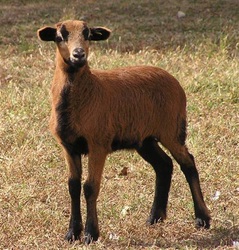Our Barbados Black Belly Sheep

When we decided we wanted to raise a few sheep, we decided on hair sheep, which means our sheep do not produce wool, and are raised for meat. We went searching for a breed we liked, and came up with the Barbados Black Belly Sheep, which have become a fairly rare breed. (tho they are coming back slowly) They should not be confused with the American Black Belly, which have horns. The Barbados are polled, meaning they have no horns. A beautiful animal, very hardy, and they produce a very lean meat. Also highly prized for training dogs to herd sheep.
More Info

The Barbados Blackbelly breed originally developed on the West Indies island of Barbados from hair sheep brought in by African slave traders during the 1600s. In 1904, the USDA imported four ewes and a ram to Bethesda, Maryland. Offspring from those sheep, as well as BB sheep making their way into the U.S. from imports into South America and Mexico, established several “colonies” of BB sheep in the U.S. Some of these BB sheep were crossed in the southwest United States with horned Ramboulliet and Mouflan to create a horned version known informally as "barbado" and now officially known as American Blackbelly. The original polled (hornless) sheep as they appeared on the Island of Barbados are known as Barbados Blackbelly. Today a small group of dedicated breeders are committed to the preservation of this rare breed of original Barbados Blackbelly sheep. Barbados Blackbelly sheep are known for their excellent tender and mild meat quality, their ease of care, their resistence to disease and parasites, and their prolific all-season breeding and lambing.
Barbados Black Belly Meat

Barbados Blackbelly lambs are purported to have less body fat than other breeds. They tend to deposit less subcutaneous fat than wooled breeds, while generally accumulating more fat around the heart and kidneys. Their meat is considered to have a milder, less muttony flavor than the lamb from wooled breeds.
Flavor of the meat is excellent, being much milder than usual market lambs. This is probably due to less fatness, since the characteristic flavor of lamb meat is primarily in the fat.
Flavor of the meat is excellent, being much milder than usual market lambs. This is probably due to less fatness, since the characteristic flavor of lamb meat is primarily in the fat.
We have live animals for sale on and off thru the year, as well as meat locally. Feel free to contact us via the contact form on the main page or "like" us on Facebook, where we post pics of animals for sale and availability of meat for sale.
